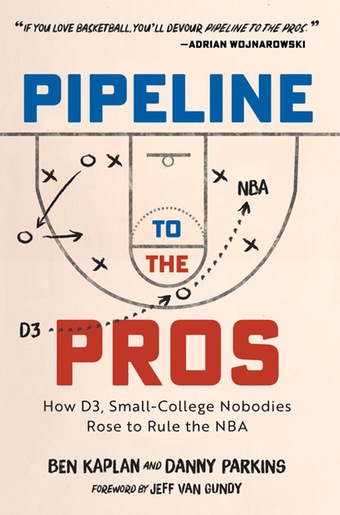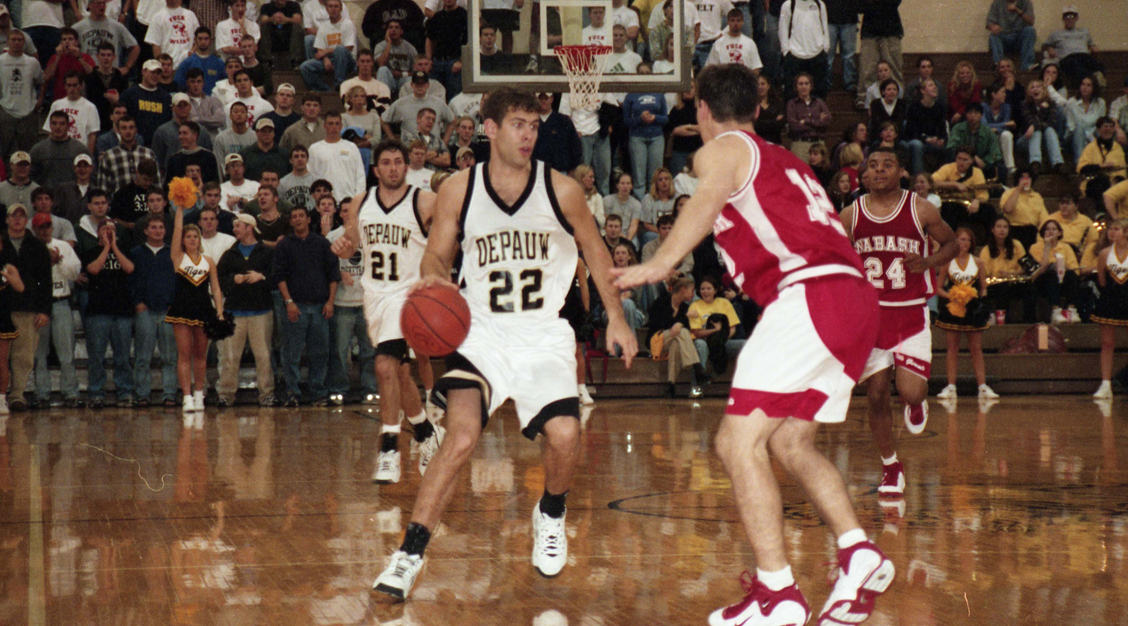| Before Brad Stevens led the Boston Celtics' front office, he was a Division III basketball player at DePauw. |
This is Part 1 of the Quintessential D3 Moment series. While researching their book Pipeline to the Pros: How D3, Small-College Nobodies Rose to Rule the NBA, authors Ben Kaplan and Danny Parkins asked some of the most accomplished former D3 hoopers for their best “love of the game” moment from their college days. The book is available for pre-sale.
By Ben Kaplan
This series beginning with Brad Stevens is fitting since he is indirectly responsible for the first seeds of an idea for Pipeline to the Pros.
In 2010, Stevens coached Butler University to a surprise appearance in the National Championship game. When the media wrote their Stevens profiles, they glommed on to the fact that his coaching career began when he left a promising marketing job at Eli Lilly for a volunteer position at Butler. But I was drawn to the period right before that bold risk–- his playing days at DePauw University.
 How was it that, in just over a decade, this guy went from playing D3 ball to matching wits with Coach K? Were there other former D3 players lurking elsewhere in the coaching ranks’ upper echelons? The answer, of course, was a resounding “yes."
How was it that, in just over a decade, this guy went from playing D3 ball to matching wits with Coach K? Were there other former D3 players lurking elsewhere in the coaching ranks’ upper echelons? The answer, of course, was a resounding “yes."
The tenth chapter of our book explores Stevens’ time at DePauw and how it helped shape his coaching and leadership style explores Stevens’ time at DePauw and how it helped shape his coaching and leadership style. The chapter also relays the incredible tale of another coach with D3 ties, Frank Vogel. Vogel played at Juniata College in Pennsylvania before transferring to the University of Kentucky (more on that decision in the book) and embarking on what would become an NBA coaching career. Both Stevens and Vogel were incredibly generous during our interviews with them, delving into their backgrounds, philosophies, and the role their D3 days played in their coaching careers.
But Vogel wasn’t the right one of our interview subjects to pair with Stevens for this series. When, in 2011, Stevens guided Butler to another Final Four, they weren’t the only underdogs. And Stevens wasn’t the only former D3 player over whom the college basketball world was fawning. Joining 8th-seeded Butler in Houston was 11th-seeded VCU, coached by Shaka Smart, a Kenyon College alum.
Stevens and Smart represented a new generation of coaches, younger men who didn’t scream at their players but instead led with intelligence and humanity. Thanks to Smart’s, well…smarts, he could’ve attended just about any college in America. He opted to play ball at Kenyon, where he graduated magna cum laude. Stevens, a graduate of DePauw’s prestigious Management Fellows program, hired the first full-time analytics staffer in D1 basketball. His peers laud him for his computer-like processing ability and recall.
When it comes to his DePauw playing days, however, the basketball server in Stevens' brain seems to have been wiped. After being asked about his D3 memories, Stevens said, “There are so many, but none of them have to do with the games. I don’t remember any part of the games.” He did eventually share a story about a time where he let out some choice words after missing a potential game-winning shot. “Then I realized there were like three professors and four parents there,” Stevens said. “That’s about it. I should probably shut my mouth. I’m not in Assembly Hall. They can hear me.”
|
From D-III to the Big Dance Former Division III basketball players |
||
| Coach | Alma mater | D-I school |
| Gregg Marshall | Randolph-Macon | Wichita State |
| Brad Stevens | DePauw | Butler |
| Shaka Smart | Kenyon | VCU |
| Paul Hewitt | St. John Fisher | Georgia Tech |
Stevens’ favorite D3 moments, the ones that stuck in that steel trap of his, were the times off the court. Like the team trip to Europe after his freshman year. Or the quieter moments with his teammates. “It all goes to bus rides, trips, meals,” Stevens said. “Going through a crushing practice over Christmas Break and no one else is on campus so you just sit at the dinner table for three hours and talk and laugh because you’ve got nothing else to do. I think that’s one of the things that’s fun about being a part of a team.”
It’s a sentiment that persists today, even as he’s involved at the game’s highest level. “Everyone asks me, ‘What’s your best memory of last year [the 2021-22 Celtics season]?’” Stevens said. “Going to the Finals, yeah that’s way up there. But I could compare that to a great meal we all had together where we laughed and where we really spent time together. Those are hard to replace.”
Unlike Stevens, Smart has remained in the college ranks, where he’s proven that that first Cinderella run in 2011 was no fluke. Last year, he coached Marquette to a Big East championship, and they have spent much of this season ranked in the top 10. Had it not been for his time at Kenyon College playing for Bill Brown, Smart might not have pursued coaching at all. Immediately after graduating from Kenyon, Smart joined the staff at D2 California University of Pennsylvania, where Brown, who had left Kenyon after Smart’s freshman year, was the head coach.
Smart is proof of just how meaningful a D3 playing career can be to a student-athlete. “I was infatuated with playing basketball,” Smart says. “My entire identity was as a basketball player. I used to carry a basketball around campus at Kenyon College. It’s laughable now, looking back on it.”
Even though the games aren’t played on the biggest of stages, they still matter deeply to those who compete in them. Smart started his first game as a freshman. He struggled, falling victim to some opening night jitters. Eventually, he got comfortable and ended up starting over half of that season’s contests. “It doesn’t matter what level you’re at, every guy, even at the highest level of basketball, guys are trying to scratch out and carve out a roll,” Smart said. “That was how it was for me.”
Although maybe the butterflies in Smart’s stomach were just hunger pangs. He vividly remembers the unfortunate meals that were foisted on him and his teammates en route to away games. “When we would go on the road, they would give us these what they called ‘boxed lunches,’” Smart said. “There would always be a sandwich in the boxed lunch that was wrapped up in this, it seemed like it was wrapped in cellophane, but the wrapping smelled bad. It was disgusting. The sandwich of course left a lot to be desired as well. I remember having to make the choice between eating this nasty sandwich or not eating at all.”
Between Stevens’ postgame curses echoing across a mostly empty gym and Smart’s potent pregame meals, both coaches’ first college basketball experiences were not exactly glamorous. But they were crucial periods that cemented their love of the game, and set them on the path to achieving a level of coaching success that, at the time, would’ve been unimaginable.
Coming next…”The Pro” featuring Duncan Robinson.
